外研版(2019)必修 第一册Unit 3 Family matters Using language 课件(共17张PPT)
文档属性
| 名称 | 外研版(2019)必修 第一册Unit 3 Family matters Using language 课件(共17张PPT) | 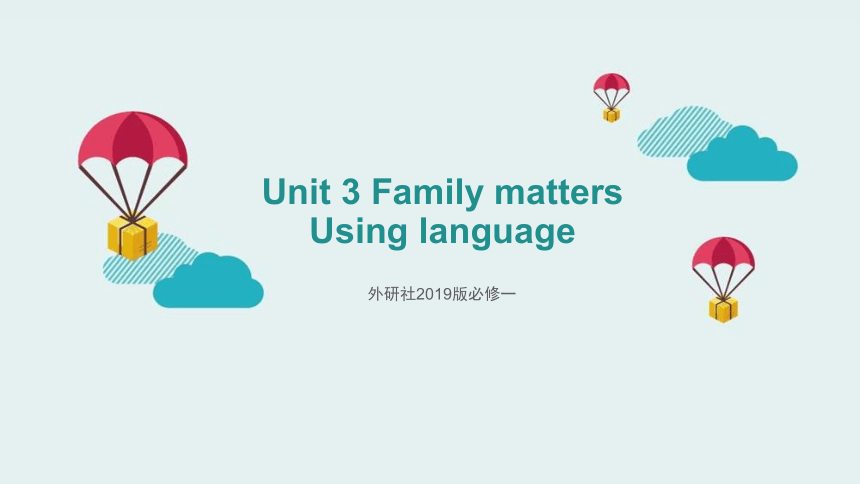 | |
| 格式 | pptx | ||
| 文件大小 | 2.1MB | ||
| 资源类型 | 教案 | ||
| 版本资源 | 外研版(2019) | ||
| 科目 | 英语 | ||
| 更新时间 | 2023-11-02 12:14:44 | ||
图片预览

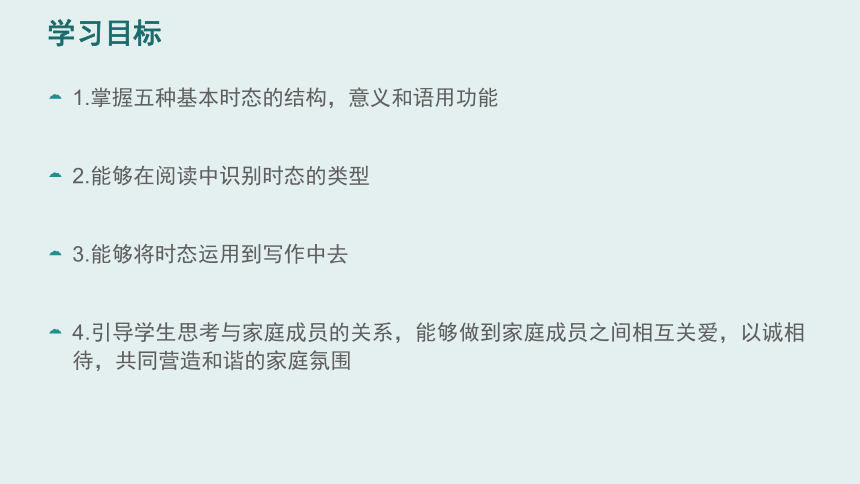
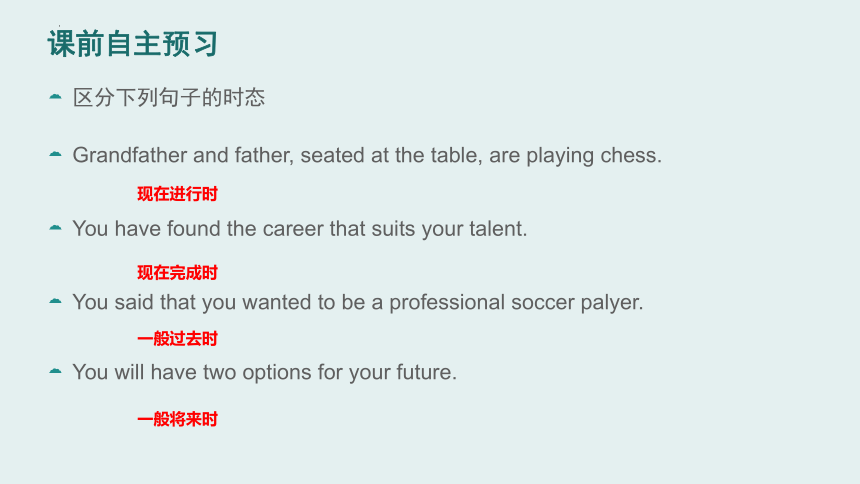
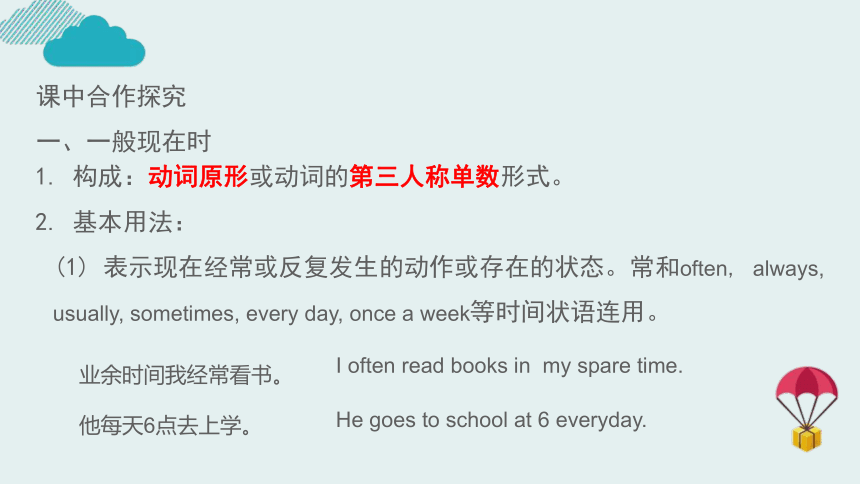
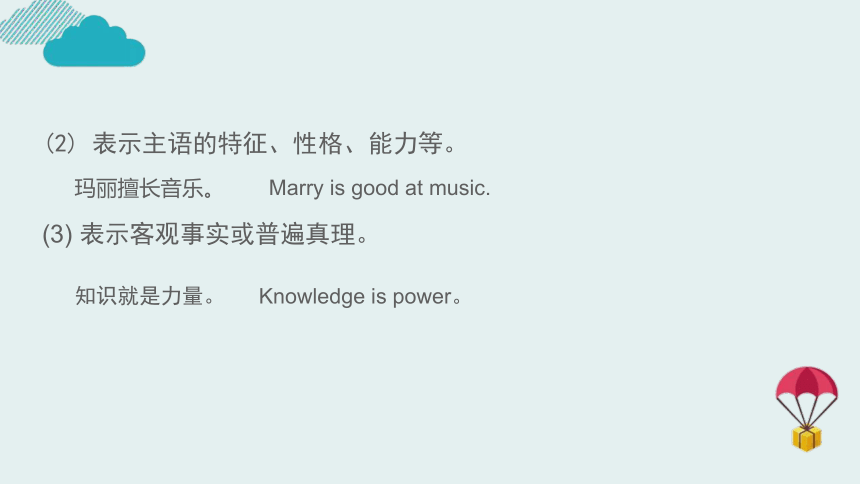
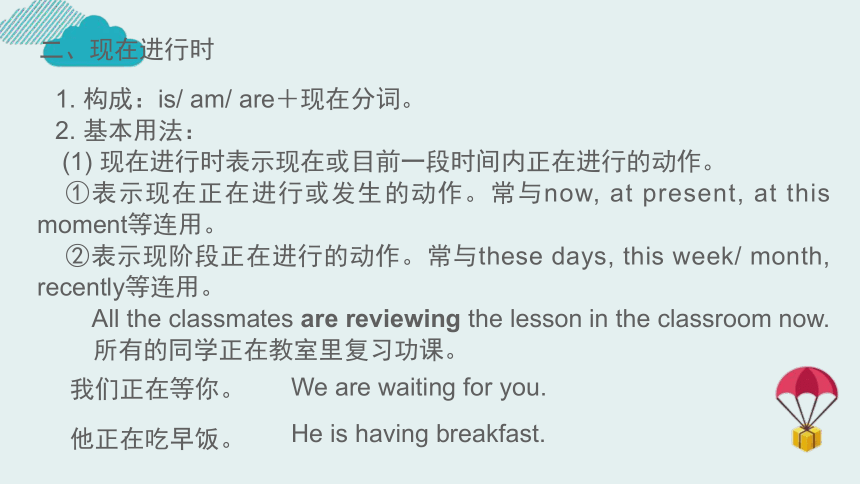
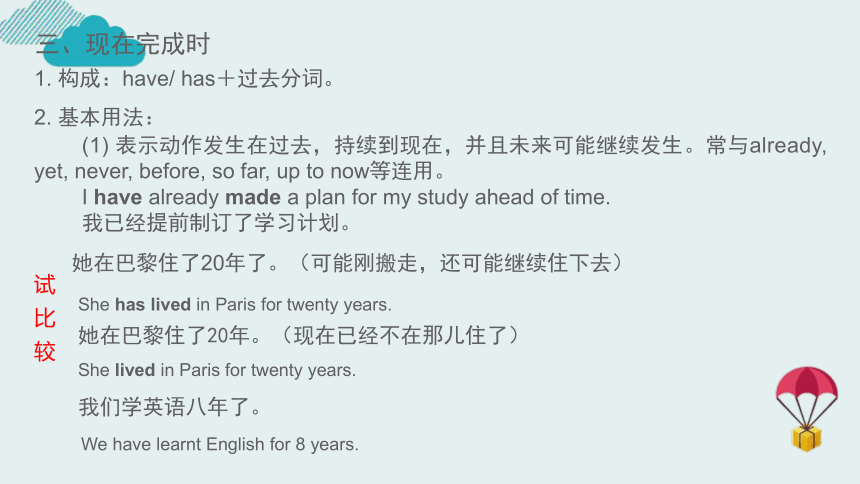
文档简介
(共17张PPT)
Unit 3 Family matters
Using language
外研社2019版必修一
学习目标
1.掌握五种基本时态的结构,意义和语用功能
2.能够在阅读中识别时态的类型
3.能够将时态运用到写作中去
4.引导学生思考与家庭成员的关系,能够做到家庭成员之间相互关爱,以诚相待,共同营造和谐的家庭氛围
课前自主预习
区分下列句子的时态
You will have two options for your future.
You have found the career that suits your talent.
You said that you wanted to be a professional soccer palyer.
Grandfather and father, seated at the table, are playing chess.
现在进行时
现在完成时
一般过去时
一般将来时
课中合作探究
一、一般现在时
1. 构成:动词原形或动词的第三人称单数形式。
2. 基本用法:
(1) 表示现在经常或反复发生的动作或存在的状态。常和often, always, usually, sometimes, every day, once a week等时间状语连用。
他每天6点去上学。
I often read books in my spare time.
业余时间我经常看书。
He goes to school at 6 everyday.
(2) 表示主语的特征、性格、能力等。
(3) 表示客观事实或普遍真理。
玛丽擅长音乐。
Marry is good at music.
知识就是力量。
Knowledge is power。
二、现在进行时
1. 构成:is/ am/ are+现在分词。
2. 基本用法:
(1) 现在进行时表示现在或目前一段时间内正在进行的动作。
①表示现在正在进行或发生的动作。常与now, at present, at this moment等连用。
②表示现阶段正在进行的动作。常与these days, this week/ month, recently等连用。
All the classmates are reviewing the lesson in the classroom now.
所有的同学正在教室里复习功课。
我们正在等你。
We are waiting for you.
他正在吃早饭。
He is having breakfast.
三、现在完成时
1. 构成:have/ has+过去分词。
2. 基本用法:
(1) 表示动作发生在过去,持续到现在,并且未来可能继续发生。常与already, yet, never, before, so far, up to now等连用。
I have already made a plan for my study ahead of time.
我已经提前制订了学习计划。
她在巴黎住了20年了。(可能刚搬走,还可能继续住下去)
She has lived in Paris for twenty years.
她在巴黎住了20年。(现在已经不在那儿住了)
试
比
较
She lived in Paris for twenty years.
我们学英语八年了。
We have learnt English for 8 years.
(2) 表示从过去开始持续到现在并有可能持续下去的动作或状态,这时往往与表示一段时间的状语连用。如:today, this week, lately, recently, these days, in the past few days, during the last two weeks, since, since two days ago, for a long time等。
We have learned English for eight years. 我们学英语八年了。
He' s lived in London since three years ago. 自从三年前他就住在伦敦。
(3) 在“It/ This is the first/ second... last time+从句”与“It/ This is the+序数词或形容词最高级+名词+that从句”这两个句型中,从句中的谓语要用现在完成时。
It is the first time I have driven a car. 这是我第一次开车。
This is the most interesting film he has made. 这是他拍的最有趣的电影。
(4) 在条件状语从句和时间状语从句中代替将来完成时。
I' ll go to the party as soon as I have finished my homework.
我一完成作业就去参加聚会。
四、一般将来时
1. 构成:shall/ will+动词原形,be going to+动词原形,be (about) to do sth
2. 基本用法:
(1) shall/ will+动词原形,表示即将发生的动作或存在的状态,特别是表示客观性的事情或在某条件下临时决定去做的事情只能用此结构。
I think they will help you if you tell them. 我认为只要你告诉他们,他们会帮助你的。
—Tom was injured badly in the accident yesterday.
—Oh, I didn' t know. I will see him after work.
——汤姆在昨天的事故中受伤很严重。
——噢,我不知道。我下班后去看他。(临时决定)
①be going to+动词原形,表示即将发生的事情或近期准备、打算、有迹象表明要做某事。
What are you going to do next Sunday 下星期天你打算干什么?
②be about to do sth意为“正要做某事;马上要做某事”。
Please get everything ready. The experiment is about to start.
请准备好。实验就要开始了。
③be to do表示按计划、职责、义务、约定要发生的动作。
Who is to clean the classroom today 今天该谁打扫教室了?
五、一般过去时
1. 构成:动词过去式。
2. 基本用法
(1) 一般过去时主要用于表示过去某一时刻或某段时间内发生的动作或存在的状态,常与明确表示过去的时间状语(如:yesterday, last week, in 1949, a few days ago等)连用。
I graduated from No. 2 Middle School three years ago.
三年前我从二中毕业。
我昨天6:30起床。
I got up at 6:30 yesterday.
他十年前住在这。
He lived here ten years ago.
She got up, washed her face, cleaned her teeth, had her breakfast and then went to work.
她起床后,洗完脸,刷完牙,吃过早饭,然后就去上班了。
课后检测
(1) 用所给词的适当形式填空
①I' ll follow him wherever he ____________ (go) .
②Helen says she will leave the company if she ____________ (punish) for her carelessness.
③I will be a nurse and look after patients when I ____________ (grow) up.
④A Midsummer Night' s Dream ____________ (open) at the Theatre Royal on 19th June, and then tours throughout Scotland.
goes
is punished
grow
opens
(2) 补全句子
⑤__________________________ at nine every day. 这家商店每天9点开门。
⑥___________________________once a week.
汤姆一周给他父母打一次电话。
⑦___________________________ London at 6 o' clock in the afternoon.
汽车将在下午6点钟离开伦敦。
The shop opens
Tom calls his parents
The bus leaves
课后检测
(1) 用所给词的适当形式填空
①Hurry up! Mark and Carol ____________ (expect) us.
②We _________________ (study) French this semester.
③A new cinema ___________________ (build) here. They hope to finish it next month.
(2) 补全句子
④The mothers now ____________________________(总是送她们的孩子) to all kinds of classes after school.
⑤We _______________________________ (将离开北京去上海) tomorrow.
are expecting
are studying
is being built
are always sending their children
are leaving Beijing for Shanghai
课后检测
用所给词的适当形式填空
①By the time he realizes he ____________ (walk) into a trap, it' ll be too late for him to do anything about it.
②His first novel ____________ (receive) good reviews since it came out last month.
③I' m glad you ____________ (make) great progress so far. Keep it up and you must be successful.
④—Oh no! We' re too late. The train ____________ (leave) .
—That' s OK. We' ll catch the next train to London.
has walked
has received
have made
has left
Unit 3 Family matters
Using language
外研社2019版必修一
学习目标
1.掌握五种基本时态的结构,意义和语用功能
2.能够在阅读中识别时态的类型
3.能够将时态运用到写作中去
4.引导学生思考与家庭成员的关系,能够做到家庭成员之间相互关爱,以诚相待,共同营造和谐的家庭氛围
课前自主预习
区分下列句子的时态
You will have two options for your future.
You have found the career that suits your talent.
You said that you wanted to be a professional soccer palyer.
Grandfather and father, seated at the table, are playing chess.
现在进行时
现在完成时
一般过去时
一般将来时
课中合作探究
一、一般现在时
1. 构成:动词原形或动词的第三人称单数形式。
2. 基本用法:
(1) 表示现在经常或反复发生的动作或存在的状态。常和often, always, usually, sometimes, every day, once a week等时间状语连用。
他每天6点去上学。
I often read books in my spare time.
业余时间我经常看书。
He goes to school at 6 everyday.
(2) 表示主语的特征、性格、能力等。
(3) 表示客观事实或普遍真理。
玛丽擅长音乐。
Marry is good at music.
知识就是力量。
Knowledge is power。
二、现在进行时
1. 构成:is/ am/ are+现在分词。
2. 基本用法:
(1) 现在进行时表示现在或目前一段时间内正在进行的动作。
①表示现在正在进行或发生的动作。常与now, at present, at this moment等连用。
②表示现阶段正在进行的动作。常与these days, this week/ month, recently等连用。
All the classmates are reviewing the lesson in the classroom now.
所有的同学正在教室里复习功课。
我们正在等你。
We are waiting for you.
他正在吃早饭。
He is having breakfast.
三、现在完成时
1. 构成:have/ has+过去分词。
2. 基本用法:
(1) 表示动作发生在过去,持续到现在,并且未来可能继续发生。常与already, yet, never, before, so far, up to now等连用。
I have already made a plan for my study ahead of time.
我已经提前制订了学习计划。
她在巴黎住了20年了。(可能刚搬走,还可能继续住下去)
She has lived in Paris for twenty years.
她在巴黎住了20年。(现在已经不在那儿住了)
试
比
较
She lived in Paris for twenty years.
我们学英语八年了。
We have learnt English for 8 years.
(2) 表示从过去开始持续到现在并有可能持续下去的动作或状态,这时往往与表示一段时间的状语连用。如:today, this week, lately, recently, these days, in the past few days, during the last two weeks, since, since two days ago, for a long time等。
We have learned English for eight years. 我们学英语八年了。
He' s lived in London since three years ago. 自从三年前他就住在伦敦。
(3) 在“It/ This is the first/ second... last time+从句”与“It/ This is the+序数词或形容词最高级+名词+that从句”这两个句型中,从句中的谓语要用现在完成时。
It is the first time I have driven a car. 这是我第一次开车。
This is the most interesting film he has made. 这是他拍的最有趣的电影。
(4) 在条件状语从句和时间状语从句中代替将来完成时。
I' ll go to the party as soon as I have finished my homework.
我一完成作业就去参加聚会。
四、一般将来时
1. 构成:shall/ will+动词原形,be going to+动词原形,be (about) to do sth
2. 基本用法:
(1) shall/ will+动词原形,表示即将发生的动作或存在的状态,特别是表示客观性的事情或在某条件下临时决定去做的事情只能用此结构。
I think they will help you if you tell them. 我认为只要你告诉他们,他们会帮助你的。
—Tom was injured badly in the accident yesterday.
—Oh, I didn' t know. I will see him after work.
——汤姆在昨天的事故中受伤很严重。
——噢,我不知道。我下班后去看他。(临时决定)
①be going to+动词原形,表示即将发生的事情或近期准备、打算、有迹象表明要做某事。
What are you going to do next Sunday 下星期天你打算干什么?
②be about to do sth意为“正要做某事;马上要做某事”。
Please get everything ready. The experiment is about to start.
请准备好。实验就要开始了。
③be to do表示按计划、职责、义务、约定要发生的动作。
Who is to clean the classroom today 今天该谁打扫教室了?
五、一般过去时
1. 构成:动词过去式。
2. 基本用法
(1) 一般过去时主要用于表示过去某一时刻或某段时间内发生的动作或存在的状态,常与明确表示过去的时间状语(如:yesterday, last week, in 1949, a few days ago等)连用。
I graduated from No. 2 Middle School three years ago.
三年前我从二中毕业。
我昨天6:30起床。
I got up at 6:30 yesterday.
他十年前住在这。
He lived here ten years ago.
She got up, washed her face, cleaned her teeth, had her breakfast and then went to work.
她起床后,洗完脸,刷完牙,吃过早饭,然后就去上班了。
课后检测
(1) 用所给词的适当形式填空
①I' ll follow him wherever he ____________ (go) .
②Helen says she will leave the company if she ____________ (punish) for her carelessness.
③I will be a nurse and look after patients when I ____________ (grow) up.
④A Midsummer Night' s Dream ____________ (open) at the Theatre Royal on 19th June, and then tours throughout Scotland.
goes
is punished
grow
opens
(2) 补全句子
⑤__________________________ at nine every day. 这家商店每天9点开门。
⑥___________________________once a week.
汤姆一周给他父母打一次电话。
⑦___________________________ London at 6 o' clock in the afternoon.
汽车将在下午6点钟离开伦敦。
The shop opens
Tom calls his parents
The bus leaves
课后检测
(1) 用所给词的适当形式填空
①Hurry up! Mark and Carol ____________ (expect) us.
②We _________________ (study) French this semester.
③A new cinema ___________________ (build) here. They hope to finish it next month.
(2) 补全句子
④The mothers now ____________________________(总是送她们的孩子) to all kinds of classes after school.
⑤We _______________________________ (将离开北京去上海) tomorrow.
are expecting
are studying
is being built
are always sending their children
are leaving Beijing for Shanghai
课后检测
用所给词的适当形式填空
①By the time he realizes he ____________ (walk) into a trap, it' ll be too late for him to do anything about it.
②His first novel ____________ (receive) good reviews since it came out last month.
③I' m glad you ____________ (make) great progress so far. Keep it up and you must be successful.
④—Oh no! We' re too late. The train ____________ (leave) .
—That' s OK. We' ll catch the next train to London.
has walked
has received
have made
has left
